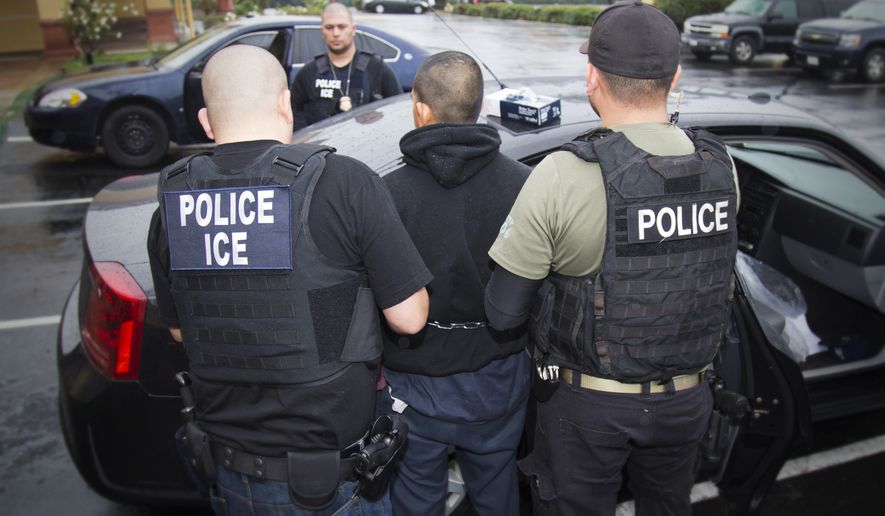Three of the 800 illegal immigrants who managed to escape last month’s enforcement sweep in the San Francisco area have already gone on to commit new crimes, notching charges of robbery, drunken driving and spousal abuse, the government’s deportation chief said Tuesday.
Thomas Homan, deputy director at U.S. Immigration and Customs Enforcement, blamed California’s new sanctuary laws with creating a culture of leniency that emboldened Oakland Mayor Libby Schaaf to issue her public warning that ICE officers were operating in the bay area.
“Three of the people we couldn’t locate have since reoffended,” Mr. Homan announced at a White House roundtable called by President Trump Tuesday to put pressure on sanctuary cities to drop their policies.
Across the nation in California, meanwhile, Los Alamitos, a small city in Orange County, voted to opt out of the state’s chief sanctuary law that restricts cooperation between local officers and federal authorities.
The city council’s 4-1 vote will have to be repeated next month to be finalized, but Mayor Troy Edgar said he hoped other cities would follow their lead.
“As the mayor of Los Alamitos, we are not a sanctuary city,” he said, the Orange County Register reported.
PHOTOS: See Obama's biggest White House fails
The city’s challenge is the latest round in an ongoing battle over three laws California enacted last year to protect illegal immigrants and thwart federal immigration agents and officers.
The chief law restricts police and sheriff’s departments from providing cooperation with immigration authorities. Another law prohibits jails from expanding contracts with the federal government to hold illegal immigrants, and gives state officials investigative powers to probe existing facilities. The third law bans businesses from voluntarily cooperating with immigration authorities.
State leaders defended the law as a compromise, saying federal agents and officers are still allowed to do their jobs, but they cannot pressure local authorities to cooperate.
The Trump administration has sued to stop all three laws. Republicans on Capitol Hill, meanwhile, want to see sanctuary cities lose access to some federal grants.
Chuck Canterbury, president of the Fraternal Order of Police, said he’d initially been worried about calls to strip law enforcement money from sanctuaries, but he said Tuesday he’s come to the conclusion there’s no other way to get jurisdictions to change.
“We have now reached a point where we realize that unless we hit cities in the pocketbook, we’re not going to stop this sanctuary city problem,” he said.
PHOTOS: All the president's enemies
The number of sanctuary policies has surged since Mr. Trump took office, with one study saying more than 400 jurisdictions enacted some restrictions on cooperation with federal authorities in 2017.
California, though, has led the way with the most wide-ranging policies — drawing cheers from immigrant-rights groups, who urged Washington not to punish sanctuaries.
“Trust between communities and law enforcement is essential to keeping families safe, and defunding or penalizing jurisdictions based on a misnomer undermines that,” said Ali Noorani, executive director of the National Immigration Forum.
Homeland Security officials, though, say the sanctuaries are mischaracterizing the situation. Mr. Homan said he’s not trying to deputize local police to enforce immigration laws, but does want “unfettered access” to local jails so people booked or serving time for convictions can be picked up and ousted.
He said smuggling cartels in Mexico and Central America are using sanctuary cities as a selling point to would-be migrants, with the smugglers saying they’ll deliver the migrants straight to the sanctuaries where they’ll be protected.
Mr. Homan is also still chafing at the warning by Ms. Schaaf, the Oakland mayor, last month.
He said one man had been released under sanctuary policies in November, after jail officials ignored an ICE request to hold him. His deportation officers tried to arrest the man last month as part of their enforcement action in Northern California, but after Ms. Schaaf’s warning he was one of the more than 800 who eluded them.
He has since been arrested for robbery and weapons violations, Mr. Homan said.
Another man was arrested for “injury of a spouse,” and a third was arrested for his third drunken-driving offense.
“So if he’s getting arrested three times, how many times has he committed this crime? That is a public safety threat,” Mr. Homan said.
Ms. Schaaf’s office didn’t respond to a request for comment from The Washington Times.
• Stephen Dinan can be reached at sdinan@washingtontimes.com.




Please read our comment policy before commenting.